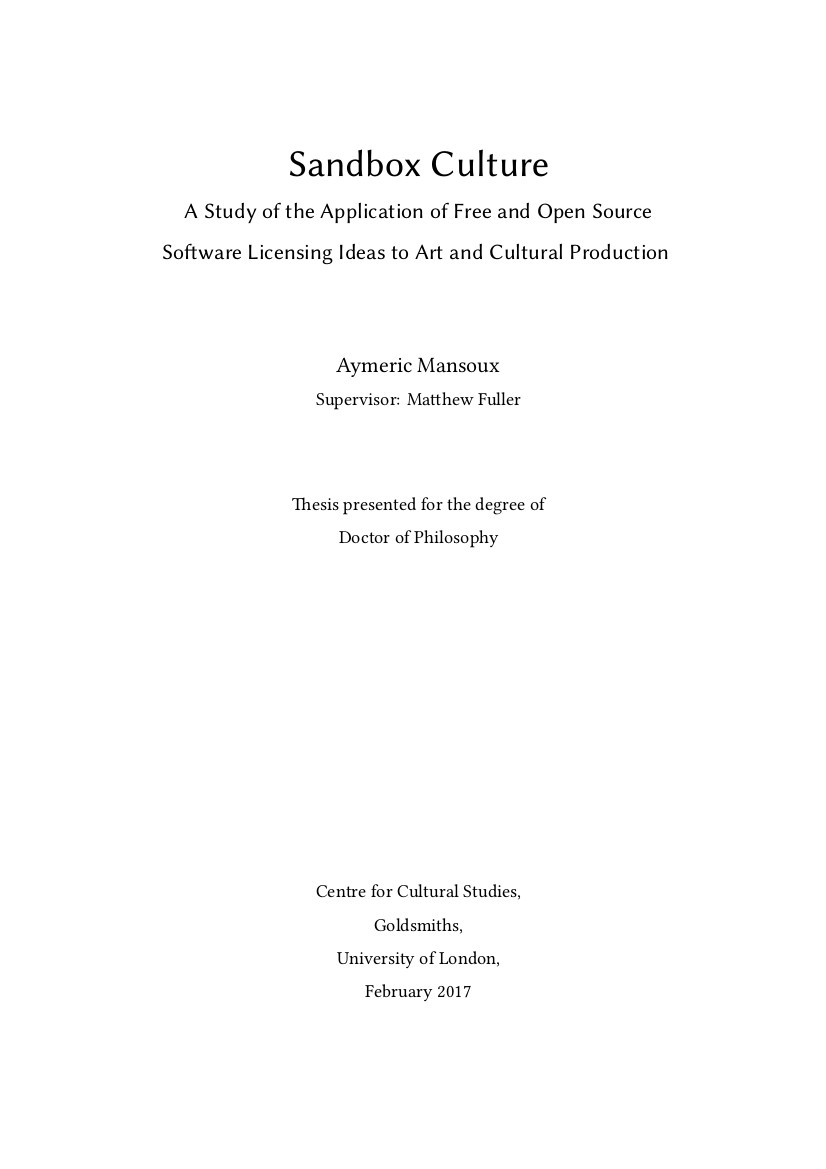Aymeric Mansoux: Sandbox Culture: A Study of the Application of Free and Open Source Software Licensing Ideas to Art and Cultural Production (2017)
Filed under thesis | Tags: · agonism, copyright, cultural production, digital culture, floss, free culture, intellectual property, law, network culture, open source, social movements

“In partial response to the inability of intellectual property laws to adapt to data-sharing over computer networks, several initiatives have proposed techno-legal alternatives to encourage the free circulation and transformation of digital works. These alternatives have shaped part of contemporary digital culture for more than three decades and are today often associated with the “free culture” movement. The different strands of this movement are essentially derived from a narrower concept of software freedom developed in the 1980s, and which is enforced within free and open source software (FLOSS) communities. This principle was the first significant effort to articulate a reusable techno-legal template to work around the limitations of intellectual property laws. It also offered a vision of network culture where community participation and sharing was structural.
From alternate tools and workflow systems, artist-run servers, network publishing experiments, open data and design lobbies, cooperative and collaborative frameworks, but also novel copyright licensing used by both non-profit organisations and for-profit corporations, the impact on cultural production of practices developed in relation to the ideas of FLOSS has been both influential and broadly applied. However, if it is true that FLOSS has indeed succeeded in becoming a theoretical and practical model for the transformation of art and culture, the question remains at which ways it has provided such a model, how it has been effectively appropriated across different groups and contexts and in what ways these overlap or differ.
Using the image of the sandbox, where code becomes a constituent device for different communities to experience varying ideologies and practices, this dissertation aims to map the consequent levels of divergence in interpreting and appropriating the free and open source techno-legal template. This thesis identifies the paradoxes, conflicts, and contradictions within free culture discourse. It explores the tensions between the wish to provide a theoretical universal definition of cultural freedom, and the disorderly reality of its practice and interpretation. However, despite the different layers of cultural diffusion, appropriation, misunderstanding and miscommunication that together form the fabric of free culture, this dissertation argues that, even though feared, fought, and criticised, these issues are not signs of dysfunctionality but are instead the evidence of cultural diversity within free culture. This dissertation will also demonstrate that conflicts between and within these sandboxes create a democratic process that permits the constant transformation of the free and open source discourse, and is therefore something that should be embraced and neither resisted nor substituted for a universal approach to cultural production.”
Includes an anthology of proto-free culture licenses, 1998-2002 (pp 382-452).
PhD Dissertation
Supervisor: Matthew Fuller
Publisher Centre of Cultural Studies, Goldsmiths, University of London, 2017
xxxviii+486 pages
via author
Alan Moore, Alan Smart (eds.): Making Room: Cultural Production in Occupied Spaces (2015)
Filed under book | Tags: · activism, anarchism, art, counterculture, cultural production, diy, social movements, squatting

“An anthology of voices from the post-1968 squatting movement in Europe and beyond. It focuses on creative production and cultural innovation driven by squats. Squatting is certainly a tactic which has enabled a tremendous body of collective culture work to be done, and new kinds of lives to be lived. Making Room lays it out in the words of those who did it and study it.
The dark matter undercommons of disobedient culture surveyed in this book begins its roam in a theoretical introduction that includes autonomist theory, ‘monster institutions’ and simple economic justice. It moves from north to south, portraying by country some specific local conditions of an international movement.”
With contributions by Miguel Ángel Martínez López, Alan W. Moore, Stevphen Shukaitis, Universidad Nómada, Tino Buchholz, Vincent Boschma, Geert Lovink, Alan Smart, Aja Waalwijk, Jordan Zinovich, Britta Lillesøe,Tina Steiger, Mikkel Bolt Rasmussen, x-Chris, Kasper Opstrup, Azomozox, Ashley Dawson, Sarah Lewison, Azomozox, Nina Fraeser, Julia Ramírez Blanco, Tobias Morawski, Eliseo Fucolti, Gianni Piazza, Assembly of Teatro Valle, Patrick Nagle, Emanuele Braga, Margot Verdier, Vincent Prieur, Jon Lackman, Jacqueline Feldman, Julia Lledin, Elisabeth Lorenzi, Julia Lledinm, Stephen Luis Vilaseca, La Casa Invisible, Stephen Luis Vilaseca, Yasmin Ramirez, Gregory Lehmann, Sutapa Chattopadhyay, Jasna Babic, Tristan Wibault, Galvao Debelle dos Santos, E.T.C. Dee, Spencer Sunshine, Maxigas, and mujinga.
Co-published by Journal of Aesthetics & Protest and Other Forms, October 2015
Designed by Other Forms
Translation Milena Ruiz Magaldi and Jeannette Petrik
Open access
ISBN 9780979137792
355 pages
PDF (27 MB)
PDF (G Drive, from publisher)
Olga Goriunova: Art Platforms and Cultural Production on the Internet (2011)
Filed under book | Tags: · art, code, cultural production, electronic literature, internet, networks, organization, software, software art, web

“In this book, Goriunova offers a critical analysis of the processes that produce digital culture. Digital cultures thrive on creativity, developing new forces of organization to overcome repetition and reach brilliance. In order to understand the processes that produce culture, the author introduces the concept of the art platform, a specific configuration of creative passions, codes, events, individuals and works that are propelled by cultural currents and maintained through digitally native means. Art platforms can occur in numerous contexts bringing about genuinely new cultural production, that, given enough force, come together to sustain an open mechanism while negotiating social, technical and political modes of power.
Software art, digital forms of literature, 8-bit music, 3D art forms, pro-surfers, and networks of geeks are test beds for enquiry into what brings and holds art platforms together. Goriunova provides a new means of understanding the development of cultural forms on the Internet, placing the phenomenon of participatory and social networks in a conceptual and historical perspective, and offering powerful tools for researching cultural phenomena overlooked by other approaches.”
Publisher Routledge, 2011
Volume 35 of Routledge Research in Cultural and Media Studies
ISBN 0415893100, 9780415893107
228 pages
Reviews: Annet Dekker (OPEN, 2012), Tony Sampson (Mute, 2012), Alessandro Ludovico (Neural, 2012), Hanna Kuusela (Media, Culture & Society, 2013).
PDF (updated on 2018-10-23)
Comments (2)
